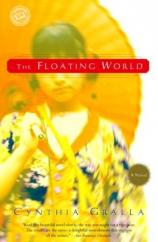Reading Group Guide
Discussion Questions
The Floating World

1. Why is this novel called The Floating World? In what way is the notion of "floating" significant here?
2. Is Liza a likable character? What qualities does she exhibit that you admire? What are her flaws? What do you think her family life was like?
3. Why does Liza go to Japan? Liza admits that there are "a couple of teachers in New York I could have studied with." What is she searching for? Does she find it?
4. How does Liza change during her time in Japan? What is the evidence that she has changed? How is she different at the end of the story?
5. Does this novel have to be set in Japan? Could it have worked if Liza never left Princeton? Where else might the author have chosen to set this story?
6. Many symbols emerge in this novel. What is the importance of "water" as a symbol? What about "food"? How does the author use water and food to convey meaning beyond what is written on the page? What other symbols do you think are important in this story? Why?
7. Liza says, "In giving food from my own starved body, I become more than I had ever been before, more than I could ever have imagined being." Why has she been so transformed by this act? What has she become? Liza vows that she will continue to serve from her body, even if it costs her her sanity or her life. Why is she willing to risk so much to serve herself up in this way?
8. Why do you think dance is so important to Liza? What is it about ankoku butoh as a form that is so riveting to her? We are told that Liza's life hinges on this dance, which is "defined by what it is not." What does the author mean by that? In what ways is Liza's life similar to butoh? Can you think of other things that are "defined by what they are not"?
9. Radiation is a significant theme in this book. In what ways would you say the people with whom Liza comes into contact are "radioactive"? Why is the penultimate chapter called "Halflife"?
10. What does Liza get from the maiko? What do they get from her?
11. Carlo refers to Liza as "Lady Dulcinea." At one point he tells her, "I am glad you are leaving the ghost of Liza far behind in your jewel-carpeted travels. When I first met the lovely Liza, I knew immediately that she was too conflicted and melancholy to remain consistent for very long." What change has Carlo identified? Is it a real change? Why does Liza endure the treatment she gets when she is with Carlo?
12. Are any of Liza's relationships with the male characters in this novel healthy? Is she capable of love?
13. Maboroshi's name means "illusion." What illusion does Maboroshi represent? Is Maboroshi a character to be feared, pitied, or embraced? Why?
14. Another powerful theme throughout this book is anorexia. Liza says she looked toward the saints as a role model, "for in them I found a starvation that was a not a dead end but a deathin- life leading to greater things: a floating, a freeing, a leaving of the body. And this, I hoped, could allow me untold treasures in dance and love." Why do you think Liza intentionally chooses to starve herself? What is she getting out of this deprivation? Can it be said that anything positive comes out of the experience?
15. Why is the moment that Liza drugs Michael so significant for her?
16. Is Liza complicit in Kajiwara's death? Why do you think the maiko attack and kill him? On that final night out with the maiko, Liza admits, "Endings I can manage. That's all this place is --- a world floating in its own end, suspended in the irredeemably riveting beauty of its own detonation." What do you think she means?
17. At the very end of the novel, Liza is in Buenos Aires. Imagine that you were going to write another chapter to finish this story. What would happen to Liza? What is she doing in Buenos Aires? She looks out the window at a fruit hawker and bends to scratch her knee. What would she do next? Where would she go? Why?
The Floating World
- Publication Date: September 28, 2004
- Paperback: 320 pages
- Publisher: Ballantine Books
- ISBN-10: 0345452925
- ISBN-13: 9780345452924






